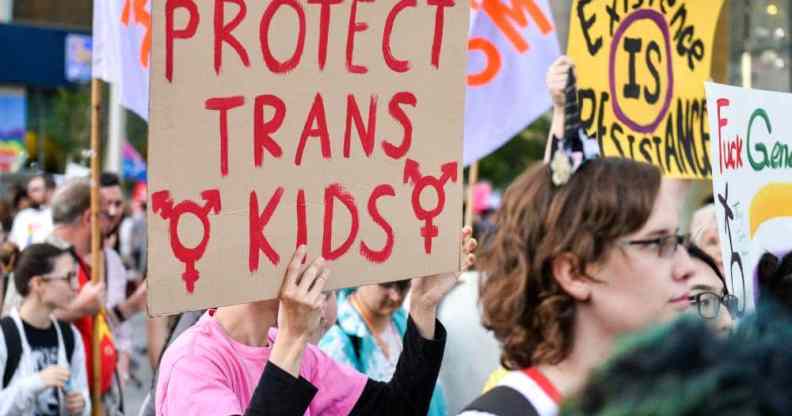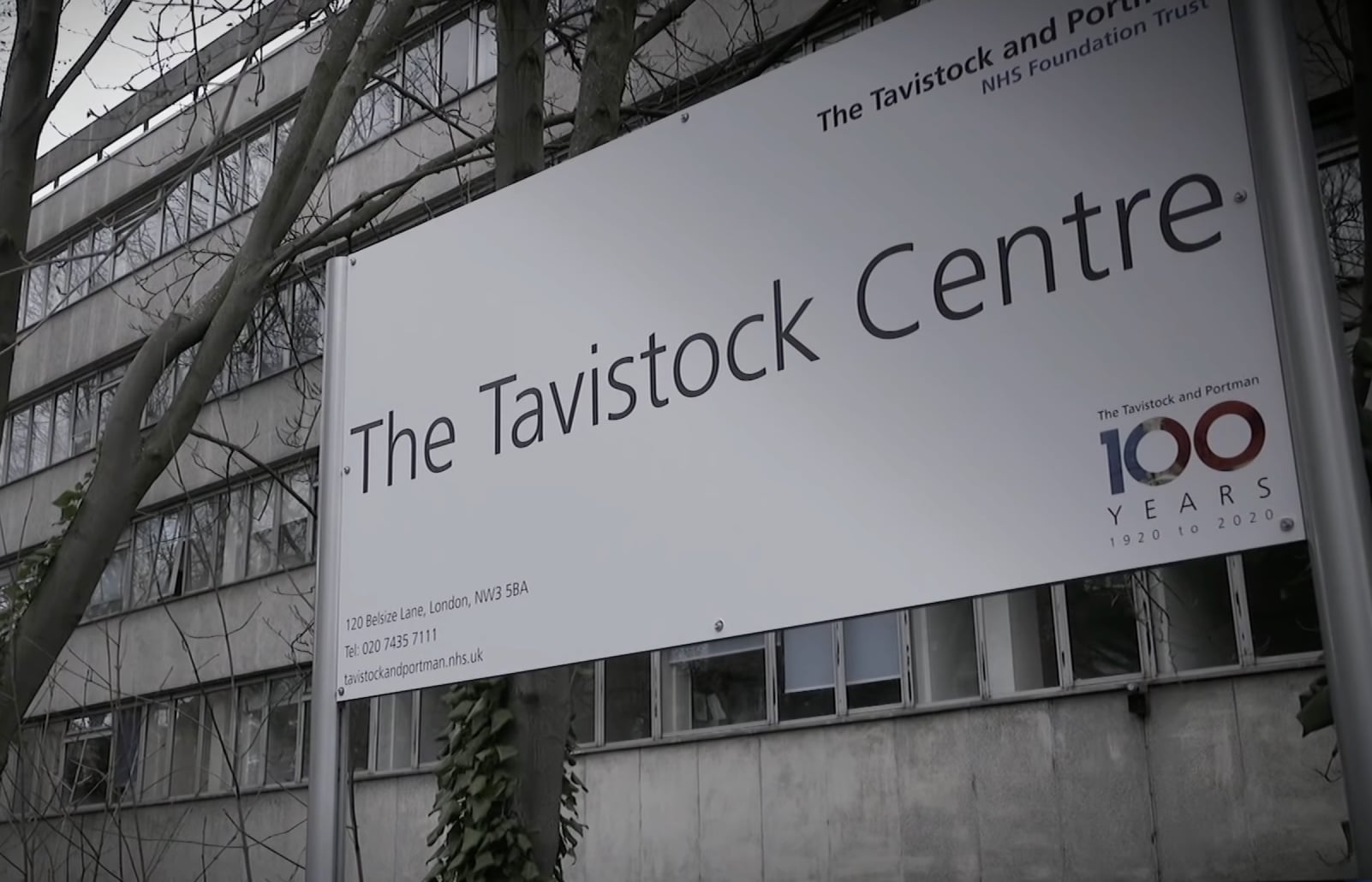Parents of trans kids welcome closure of ‘broken’ Tavistock youth gender clinic

A placard says “protect trans kids” during the trans march on the streets of Toronto during Pride month. (LightRocket via Getty/ Anatoliy Cherkasov/SOPA Images)
Parents of trans children welcomed the upcoming closure of the Tavistock’s “broken” youth gender clinic, the only NHS service of its kind, but are fearful of what the future may bring.
NHS England announced on Thursday (28 July) that the Tavistock and Portman NHS Foundation Trust will shut down its Gender Identity Development Service (GIDS) by next spring.
GIDS is set to be replaced by new regional centres, which NHS England said would provide a more “holistic and localised approach” to healthcare for trans youth. The move will begin with two “Early Adopter services” run by specialist children’s hospitals.
Parents described the Tavistock’s Gender Identity Development Service as an ‘absolutely broken institution’ which is ‘not salvageable’
One parent, Helen, whose trans child used the GIDS service for years before moving to adult services, told PinkNews that affirming parents of trans kids have been forced to defend GIDS as the only provision of its kind on the NHS, despite it being an “absolutely broken institution that has been damaging to many children”.
“The fact that it was the only option available for trans kids meant that we were in this bizarre situation of publicly having to defend the Tavistock, while at the same time battling with them to try and make the situation better, either individually for a child or just generally for for all kids,” she said.
Her son’s care under GIDS was initially positive, with a prompt assessment and a straightforward referral for puberty blockers. However after these were prescribed, his care lacked direction.
“From that point on, it felt like it was a little bit like they were winging it,” she said.
Helen and her son found that during the therapy sessions offered by the Tavistock, he was asked a lot of questions and treated “almost like a little bit of an academic curiosity”.

Tavistock Centre. (YouTube)
Other major issues included that the staff who were evaluating children for medical interventions were the same ones offering therapy sessions, meaning that “no young person or family member was ever going to be open with them, because there was forever this fear that they were gatekeeping and that they would stop access to medical support”, and that GIDS refused to even discuss cross-sex hormones.
Another parent, who asked not to be named, described “terrible” and “traumatising” appointments with GIDS, a service they said was “not salvageable”, and explained that they eventually decided that their daughter should stop attending appointments.
They told PinkNews: “We’ve been through complaint procedures, changed clinician several times, to try and find a clinician who we would trust with our child and we haven’t found one.”
“Some of the sessions I genuinely found traumatising and upsetting, and would leave in tears after every session,” they continued.
“It was just really, really stressful trying to find someone who I would trust to be a trans-positive force and not traumatise my kid… My kid is not going to go to GIDS at the moment, and I have no intention for her to go to the new service until they’ve shown themselves to be trustworthy and trans-positive enough.”
The decentralisation of youth gender care could revolutionise the experiences of parents and children
Parents have long been calling for the decentralisation of youth gender care in the UK, as children spend years on waiting lists before being seen, and the proposed new services provide an incredible opportunity to overhaul the system and correct the problems associated with GIDS.
But with less than a year until the Tavistock’s service is set to close, parents fear that improvements are going to be hard to implement.
The anonymous parent said: “The things that I think the service needs to be doing is standing up for trans kids in the public discourse, which services in other countries do really well… That kind of public messaging is actually critical to the service, because that then filters into schools, into families, and into how the world treats trans kids.”
Supporting parents to “deal with their own transphobia and cisnormativity” so that they “can be good parents to trans kids” is also a crucial element of what the new services need to be doing, they said.
They also called for the new centres to have a “commitment to depathologisation”, which should be “at the heart of the service”, and a “centring of child rights”, while also questioning how staff will be recruited and what qualifications they will require.
GIDS currently employs ambiguously-named “gender specialists” who come from a wide range of backgrounds, but the parent suggested that the role could be opened up more to “trans people or trans-positive people”.
“Then you can have a intelligent conversation about gender and identity and minority stress and things like that,” they said.
“But if you’re going to fill those roles with people who are, at best, people who are interested in researching gender, that’s a big red flag and problem.”
The NHS has the chance to create holistic and timely care for trans youth, but parents have little hope
Helen would ideally like to see a triage model, inspired by Johanna Olson-Kennedy medical director of The Center for Trans Youth Health and Development as Los Angeles Children’s Hospital.
This would mean that each young person is individually assessed based on their needs and wants, and would be able to access services using “a hub and spoke format”.
For example, if a teenager were to come in wanting puberty blockers, they would be assessed, provided informed consent information, and referred to an endocrinologist, and if they came in wanting help with figuring out their gender identity, they could be referred for therapy.
“You can go and talk to them, and then be triaged and sent in these different directions,” said Helen. “I’m really hopeful that that’s what this might be.”
But the barrier that both parents brought up time and time again was trust – without regaining the trust of service users, parents and the wider trans community, there will be no meaningful engagement.
For the parent who took their daughter out of GIDS, the future looks “bleak”.
“As someone who cares about trans youth, and also has a kid in the service, I just don’t trust them, I don’t trust them with my child,” they said.
“I don’t trust them with trans children. At best, they’re like, ‘Oh, this is an interesting research topic’, and at worst, it’s like a distraction from global crisis.
“There’s looking at individual trans children and saying, ‘Well, how can we actually make their lives better?’ That’s not at the heart of any of what’s going on.”
Despite Helen’s dream of a holistic and individualised youth gender service, she said: “Realistically, I’m more sceptical… My main concerns are the level of training that’s going to be needed for these diverse mental health and healthcare experts to make sure that they actually understand trans issues, trans kids, and how to relate to them.”
She continued: “I’m absolutely certain there are going to be a whole load of gender critical transphobes that are going to be jumping at the opportunity to install themselves in advisory or training capacities to get across their own poisonous version of what should be done.
“So there’s a constant feeling that we’re going to have to watch our backs and try to see off those who are purposefully trying to stall trans kids transitioning because they are ideologically wedded to the idea that trans kids either don’t exist or shouldn’t exist.”

